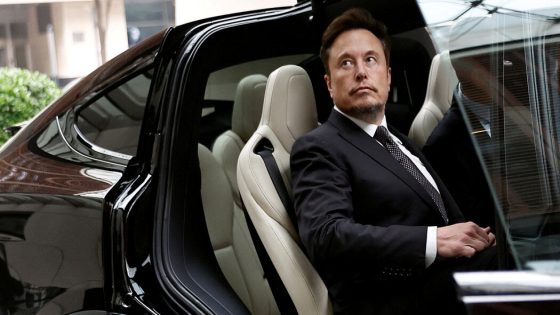Tesla’s woes prompt an E.V. reassessment
Wall Street has sounded the alarm for weeks that the transition to electric vehicles may be stalling, despite billions in government subsidies and huge investments by auto giants.
Tesla’s latest sales figures suggest that the pullback may be worse than thought — and beyond one company’s ability to fix.
Tesla’s numbers undershot forecasts. The car maker’s stock fell nearly 5 percent on Tuesday after it reported deliveries of 387,000 cars worldwide in the first quarter — the Evercore ISI estimate was 443,000 — in its first year-on-year quarterly decline since 2020.
That has contributed to a more than 30 percent decline in Tesla’s stock, which has made it one of the worst performers on the S&P 500 this year.
Tesla had warned of “notably lower” growth this year. The company has faced setbacks including a suspected arson attack on its German gigafactory and shipping delays tied to the turmoil in the Red Sea. Meanwhile, high interest rates and the rise of cheaper Chinese E.V.s are sapping global demand and eating into Tesla’s once dominant market share.
Some Elon Musk critics — including Ross Gerber, an outspoken Tesla investor — laid the blame squarely on the company’s C.E.O., saying that his “toxic behavior” had “ absolutely damaged the brand.” (Musk has said little about the Tesla numbers, except to call Gerber “ an idiot,” and to note “it was a tough quarter” for all E.V. makers.)
Musk isn’t wrong on that front. China’s BYD, which briefly dethroned Tesla as the world’s biggest E.V. maker, on Tuesday reported sales of roughly 300,000 last quarter, a 13 percent gain from the same period earlier but a quarter-on-quarter dip. The Warren Buffett-backed carmaker has gained market share in Europe and Asia by appealing to more cost-conscious buyers, though it doesn’t sell cars in the U.S. because of tariffs.
Kia, Toyota and Volkswagen have reported better sales growth, though all are coming off smaller bases than Tesla or BYD.
Analysts are worried that E.V. demand may cool further. Government credits for car buyers in the U.S. and Europe have expired in recent months. And concerns about charging times and battery range are pushing some consumers to pick hybrid-engine vehicles or stick with less expensive gasoline-powered ones.
Is it a blip? Over all, E.V. sales were flat in the fourth quarter of 2023, despite being up 40 percent year on year, “suggesting a sharp deterioration in growth,” Tom Narayan, an auto analyst at RBC Capital Markets, wrote to investors on Tuesday.
HERE’S WHAT’S HAPPENING
President Biden talks trade, TikTok and more with China’s Xi Jinping. In a call on Tuesday, the two leaders covered trade policies, the detainment of U.S. nationals and China’s support of Russia despite its full-scale invasion of Ukraine. The conversation precedes Treasury Secretary Janet Yellen’s visit to Beijing this week, where she is expected to address China’s dominance over raw materials essential for E.V.s and solar panels.
Fed officials warn that they’re in no hurry to cut interest rates. Two voting members of the central bank’s rate-setting committee, Loretta Mester and Mary Daly, said that they saw three cuts as likely this year — but added that, with the economy growing, there’s no rush to do so. Investors on Wednesday penciled in a 66 percent chance of a June cut, down slightly from the prior week.
Taiwan is rocked by its worst earthquake in decades. The 7.4-magnitude tremor, which struck shortly before 8 a.m. local time, occurred in the country’s east coast but could be felt in the capital, Taipei; at least nine are dead and hundreds are wounded. TSMC, the world’s biggest maker of advanced semiconductors, briefly evacuated some factory workers, amid worries about potential harm to the country’s chip manufacturing sector.
Can going private fix Endeavor’s problems?
After years of complaining that public investors didn’t understand what they were building, Endeavor executives, led by the Hollywood superagent Ari Emanuel, are finally getting their wish: a breakup with Wall Street.
But will taking Endeavor private — with the help of Silver Lake, its longtime financial partner — actually make help the company grow?
Endeavor was built on serial deal making. Emanuel and his team believed that their company could be not just be a talent agency, but an entertainment hub that supplied media companies with content (and the talent that created it) as well.
With the help of Silver Lake, which invested in Endeavor in 2012, Emanuel bought an array of assets: IMG, the sports- and fashion-focused talent agency, Professional Bull Riders; New York Fashion Week; and sports-betting technology.
The crowning achievement was buying Ultimate Fighting Championship and World Wrestling Entertainment, combining them into TKO Group, a publicly traded combat-sports company that Endeavor controls.
But investors were unimpressed, with Endeavor often trading below its I.P.O. stock price.
Going private means that Emanuel and Silver Lake are freer to pursue their vision: “We are all in on working with the Endeavor team and our trusted anchor investors to create value by accelerating growth at scale,” Egon Durban, Silver Lake’s co-C.E.O., said of the deal announced on Tuesday, which values the company at $13 billion, including debt.
The big question: Will Endeavor’s strategy make sense now? Profiting from content deals hasn’t always worked out. TKO’s stock tumbled after W.W.E. scored a better rights agreement for its SmackDown franchise.
But Endeavor and Silver Lake appear to be betting that they’ll benefit from giving their premium strategy more time to play out. They also believe that the sum of Endeavor’s parts are greater than yesterday’s deal valuation.
Silver Lake has gotten rich from this kind of deal before. It partnered with Michael Dell to buy out other investors in Dell, then a mostly unloved maker of personal computers. That deal was bitterly contested by the activist financier Carl Icahn, who accused the two of buying the computer maker on the cheap.
Dell Technologies eventually returned to the public markets — and Dell, Silver Lake and their partners are believed to have made a profit exceeding $40 billion.
The deal hurdles facing Paramount’s board
Merger talks between Paramount, the media company that’s the home of the “Top Gun” franchise and Nickelodeon, and the studio Skydance are heating up, with the two discussing entering into exclusive talks, DealBook’s Lauren Hirsch and The Times’s Benjamin Mullin report.
Such a move would be a big step forward in a process dogged by uncertainty for months. But many questions, and obstacles, remain.
The Paramount special board committee is under extra pressure to be fair. Shari Redstone controls Paramount via special shares held by National Amusements, her family’s holding company. Under the terms being discussed, Skydance would buy National Amusements and then combine with Paramount.
But virtually every time there’s a controlling shareholder, companies appoint a group of directors to ensure that any offer treats all investors fairly.
Given the shareholder litigation over the merger of Viacom and CBS that created Paramount, the special committee here has been especially cautious, DealBook hears. Some investors have expressed concern that a Skydance deal would benefit Redstone more than other shareholders.
Then there’s the question of cultural fit. Personality matches matter in any deal, but are especially pertinent when it comes to media companies that tend to have executives with outsize personas.
How will that play out in the potential union of an old-school company like Paramount and Skydance, a much-younger studio led by David Ellison, the son of the tech billionaire Larry Ellison?
Don’t forget that there are others interested in Paramount. They include the investment firm Apollo, which has offered $11 billion to buy Paramount’s movie studio, and the media mogul Byron Allen.
“I wanted to have you on a podcast, and Apple asked us not to do it.”
— Jon Stewart, a host of “The Daily Show.” On his most recent episode, he told his guest, the F.T.C. chair and aggressive antitrust enforcer Lina Khan, that when he had an Apple TV+ show, the tech giant urged him not to interview her.
Behind Biden’s love-hate approach to corporate America
President Biden has taken aim at big companies in recent months on issues including rising prices, tax breaks and big mergers. But he has also introduced huge corporate subsidies via his climate and manufacturing laws, and presided over an enormous increase in oil production.
In short, he has sought to walk a fine line between challenging corporate America and courting it to help carry out his policy goals, The Times’s Jim Tankersley writes. His re-election chances may depend in part on how well he manages that balance.
Democratic pollsters have encouraged Biden to hit big companies for political gain, particularly by emphasizing his plans to raise corporate taxes and call out companies for so-called shrinkflation and junk fees.
The hope is that those attacks will expose a vulnerability for Donald Trump, whose policies as president largely benefited companies — and who is currently leading Biden in key battleground states, according to a new poll.
Biden has also sought counsel from C.E.O.s. He regularly asks their advice on issues including supply chains and worker training. Key initiatives like infrastructure improvements and increased domestic manufacturing rely on cooperation with the private sector.
Not all corporate leaders buy his approach. C.E.O.s including Jamie Dimon of JPMorgan Chase and Ken Griffin of Citadel have criticized Biden’s economic policies, while oil and gas executives have denounced an administration pause on the permitting of new liquefied natural gas export terminals.
Some may favor the likely chaos of a potential Trump return. “You can look at a Trump administration with a lot more uncertainty, but directionally, the regulatory effort was moving to lighten the regulatory costs,” Neil Bradley, the chief policy officer at the U.S. Chamber of Commerce, told The Times.
While the Biden administration has been clear about what regulations will look like, they’ll still be onerous, Bradley added. “And so, interestingly, there’s a lot of people saying, ‘The chaos is better,’” he said.
THE SPEED READ
Deals
Policy
Best of the rest
We’d like your feedback! Please email thoughts and suggestions to [email protected].
Source Agencies



